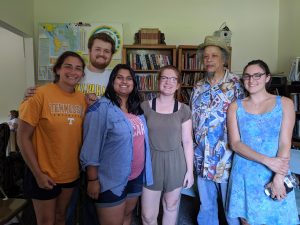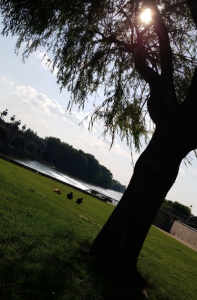Times of transition. They are different for everyone and people experience them in different ways; however, what usually links them together is the reflection that occurs from going from one chapter of life to another. This summer has been a time of transition for me as I am in the gap of time between being a student and being an “adult”. Graduating from Valpo this past May marked the end of my time as a student and my CAPS experience has been a blessing as it has been the experience that I needed during this time of transition within my life. It has provided me with time for the reflection, growth and self-discovery that is integral following a major chapter of life.
Below is an excerpt from my CAPS personal statement that I wrote as I was applying to the fellowship program:
One of the biggest question that I keep asking myself is how can I help people find their own vocations when I am so uncertain about how to enter into mine? I have found my calling, but I do not know how to get there; I am questioning how I can personally make a difference in the lives of refugees. In today’s political climate I am having a hard time understanding how people can be afraid of individuals who are just trying to live in a place where they feel safe and accepted. I ask myself where is the best place for me to begin working with refugees and immigrants when their future in the United States is so uncertain. Knowing that migrants are people that deserve to be treated with respect, how can I improve the environment in which they are entering into?
How can I improve the environment in which refugees are entering into? The answer I have learned from this summer… by walking alongside them wherever they are in life. These are individuals that are in major times of transitions within their own lives. They have packed their entire lives into a few bags, flew to a new country, and are trying to create lives for themselves in their new home. What I think is so valuable about the work that Heartland Alliance does and how they do it is the fact that they are meeting participants where they are at in their journey of resettlement.
It ranges from extensive interactions during the first few weeks and months upon arrival to assisting in navigating employment changes to times in which the participants ask for guidance down the road. For me, a majority of my interactions with participants occurred during the first few weeks after arriving in Chicago right in the heart of that time of transition. It included navigating social security and public benefits, accompanying to medical appointments, demonstrating how aspects of an apartment work and anything else that needed to be done.
While working with individuals that are going through their own times of transition really helped me in understanding about my own, it put some of my feelings into perspective as everyone goes through these times of transitions within their own lives. Yes, I learned that it is okay to feel scared and nervous. It is okay to feel overwhelmed and lost. It is okay to be excited while also being terrified and it is okay to lean on others and ask for support. This summer I learned that walking alongside refugees as they resettle in the US results in you being the person that they lean on sometimes. For me, I knew that it was okay for me to lean on others for support as well: my family, friends, roommates and the list goes on.
Everyone is going some through time of transition whether that is the time between student and “adult” like myself, a new job, a new relationship, a new health matter or any other new element of life. We all need to be the support for others to lean on just as we have relied on the support of others. One aspect that CAPS has taught me is that we can impact the environment in which the people around us are in just by walking alongside them wherever they are at with their journey especially during their times of transition.
 Kheprw staff. I had no idea that this place would become my home away from home -and these people would become my family away from family. Each morning we would have two hour discussions about our day- our goals, plans, accomplishments, and most notably how we are doing. In any “professional” space I have been, discussing your personal feelings and concerns were off the table. Here at Kheprw, they are welcomed. It is a support group unlike any other.
Kheprw staff. I had no idea that this place would become my home away from home -and these people would become my family away from family. Each morning we would have two hour discussions about our day- our goals, plans, accomplishments, and most notably how we are doing. In any “professional” space I have been, discussing your personal feelings and concerns were off the table. Here at Kheprw, they are welcomed. It is a support group unlike any other.  Overall, I am grateful for this experience. I learned more than I could have in the classroom and had enough support to do it without overextending myself. While I am excited to see my family and friends again (combining the time studying abroad and working here, I’ve been away for almost eight months now), I am also sad to leave. Through this program, I was able to broaden my connections, my education, and my ideas of what service, leadership, and purposeful work mean. I am excited to forge a new path ahead of me but I will never forget what and who helped me get there.
Overall, I am grateful for this experience. I learned more than I could have in the classroom and had enough support to do it without overextending myself. While I am excited to see my family and friends again (combining the time studying abroad and working here, I’ve been away for almost eight months now), I am also sad to leave. Through this program, I was able to broaden my connections, my education, and my ideas of what service, leadership, and purposeful work mean. I am excited to forge a new path ahead of me but I will never forget what and who helped me get there.